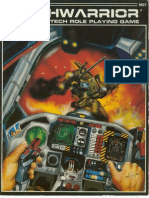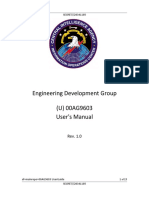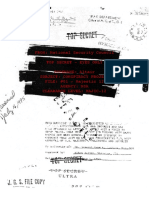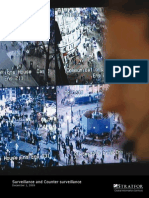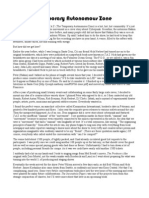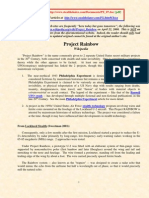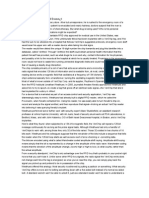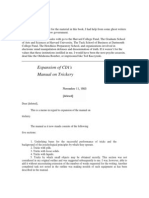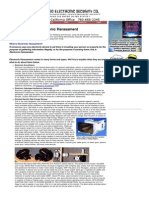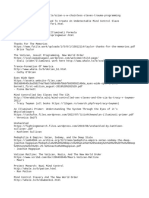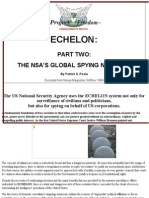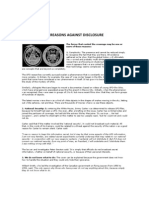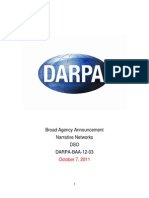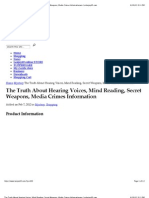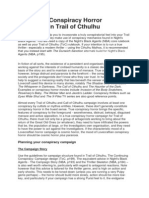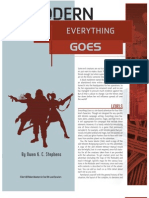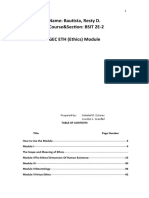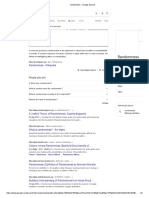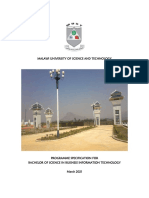Top Secret
Top Secret
Uploaded by
PaulCopyright:
Available Formats
Top Secret
Top Secret
Uploaded by
PaulCopyright
Available Formats
Share this document
Did you find this document useful?
Is this content inappropriate?
Copyright:
Available Formats
Top Secret
Top Secret
Uploaded by
PaulCopyright:
Available Formats
TOP SECRET
Careers, skills and equipment for Espionage in the Alternity game.
The world of international espionage makes an exciting setting for roleplaying--whether it is the mythical world of James Bond, the Impossible Missions Force, and U.N.C.L.E., or the real world of Mata Hari, Julius and Ethel Rosenberg, and the Walker family, or some combination of the two. TSRs Top
SECRET game, published in 1980, still has its loyal fans, but the ALTERNITY game is equally
well--suited for a campaign featuring themes of espionage--whether set in the present day or the far future. The DARK*MATTER campaign is especially appropriate for espionage action, with heroes working for or against such mysterious and secretive agencies as the CIA, NSA, and others. Whether you play in a Bond-style spy--fi campaign, a hard--hitting realistic espionage campaign, or a conspiracy--shrouded campaign with aliens and magic like the DARK*MATTER setting, you can use these careers, skills, and equipment to help you create a hero to stand among the great secret agents of fact and fiction.
The Espionage Campaign
Like any other science-fiction campaign, an ALTERNITY espionage campaign can fall into a variety of sub-genres and time periods. Your campaign could take place during World War II, with agents stealing and trafficking in military secrets around the globe. Perhaps the fullest flowering of military and political espionage in history occurred during the years of the Cold War, which became the classic setting for much spy fiction. A contemporary espionage campaign could have several different themes: military, anti-terrorism, corporate spying, or conspiracy (like the DARK*MATTER campaign). You could also construct a near future espionage campaign that involved conflict between humanity and an alien race that has arrived in our solar system, military espionage in World War III, or whatever else you can imagine. Espionage activities can be classified into three broad categories: intelligence gathering, counterintelligence, and covert action. Intelligence gathering involves a broad spectrum of activities: sifting through satellite photographs, reading foreign newspapers, monitoring telephone taps, and infiltrating a foreign embassy to steal secret files. The purpose of intelligence gathering is to provide evaluated information to political decisionmakers, whether they are heads of state or agency administrators. In 1981, President Reagan issued an executive order defining the intelligence gathering function of the U.S. intelligence system as: Provid[ing] the President with the necessary information on which to base decisions concerning the conduct and development of foreign, defense, and economic policy... (Executive Order No. 12333, December 4, 1981). In a military campaign, intelligence gathering generally focuses on troop movements, enemy capabilities, and key locations. Corporate spies, naturally, gather intelligence about their competitors products and trade secrets. An anti-terrorist agency would focus on gathering information about terrorist groups, their leaders, and their activities. Counter-intelligence is the important task of protecting secrets -- military, corporate, and so on -- from competing intelligence agents. An important part of this work is monitoring the activity of other espionage organizations and detecting their operatives. The former KGBs Third Chief Directorate was responsible for internal security and might have included the notorious Smersh -- the death to spies organization of trained assassins that so often opposed James Bond. Covert action is the most controversial and dangerous form of espionage activity. Covert projects might include direct intervention in the political or economic affairs of another country through assassinations, paramilitary operations, military training and funding of insurgent forces, and similar activities. Naturally, corporate spies might engage in covert action as well -- sabotaging competitors equipment or facilities, for example, or even killing key figures. Nearly all covert action of this type is illegal, although government agencies can conduct these affairs with little fear of legal reprisal. Within this broad framework of espionage activities, agents might be assigned to a variety of specific missions: assassination, protecting a defector, bombing or sabotage, hijacking, theft, planting false information,
surveillance, tailing, delivering a message, rescuing a prisoner or hostage, recovering stolen goods or information, or any number of activities.
Espionage Careers
In an espionage campaign, most agents are members of the Free Agent profession, though Tech Ops also have important roles in a spy organization. Combat Specs and Diplomats (usually with Free Agent as their secondary career) have their uses as well. What the sample careers in the ALTERNITY Players Handbook lump together under the single career of spy the espionage world classifies into a plethora of different roles and responsibilities. There is some overlap among the different careers, but each one reflects a specialized outlook and suitability for a particular kind of mission. The most effective espionage teams combine agents with different specialties into a highly effective unit. These careers originally appeared in the Top SECRET game rules and Basic Bureaus and Special Agents, in DRAGON Magazine #47, both by Merle M. Rasmussen. The careers follow the format of the samples in Chapter 6 of the ALTERNITY Players Handbook, but many of the packages have a total cost up to 40 skill points. Assuming that heroes involved in intelligence have exceptional Intelligence scores, these skill packages reflect demanding training. Note that any of these careers would work for a hero (or villain) in the DARK*MATTER campaign setting, reflecting a member of the CIA or another real world espionage agency, or even a specially-trained member of an organization like the Hoffmann Institute. Each career description offers suggested roles in the DARK*MATTER setting for heroes who choose that career, along with arcane skills that are particularly appropriate for such heroes, if any. Additional careers that might be appropriate for espionage agents include the generic spy described in the Players Handbook, the shadow spy described in Dataware, and the field agent described in the DARK*MATTER campaign setting.
Confiscator (Free Agent)
Sometimes a government or intelligence agency needs something stolen. That something can be anything from a camera holding an incriminating photograph of a public figure to a prototype stealth bomber. Whatever the object, the confiscator is the agent for the job. Manipulation and Stealth skills are key for a confiscator as well as Security- security devices. Besides these core skills, more physical skills like Athletics and Acrobatics often prove useful in confiscation missions. Businessillicit business, Street Smart, and Deception reflect both a confiscators shady past and help him achieve his objectives. Naturally, combat skills are important as well. In the modern age, where information is a precious commodity, Computer Science- hacking is a useful skill, though the wizard career better describes a technicalminded confiscator. Vehicle Operation is also an important skill, both for getaways and for those missions where the item to be stolen is a vehicle in need of a driver. Signature Equipment: Lock-pick set, flash-light, small pistol. Skill Package: Manipulation-lockpick 2, pickpocket; Stealth-hide, sneak; Security-security devices; Deception. Cost: 39 points. In the Campaign: In the world of the DARK *MATTER campaign setting, there is much to steal: pieces of alien technology, papers detailing dark conspiracies, codes from the gene libraries of the Greys, and spells from the hidden collections of the Vatican. Confiscators are highly prized by organizations and conspiracies whose goals involve the acquisition of any such items or information, including the Rosicrucians, the Hidden Order of St. Gregory, and the Center for Xenological Studies. Arcane Knowledge: Confiscators with the ESP-psycholocation psionic ability are unusually adept at finding the objects they are assigned to steal, while those with Telepathy- obscure are more able to escape detection while performing their duties.
Hunter (Free Agent)
While an assassin is a trained killer, the hunter is master of the art of stalking prey -- in this case, human prey. The hunter learns the movements and habits of enemy agents, diplomats, corporate executives, crime bosses, terrorist leaders, or other targets. Keeping to the shadows, the hunter combines an assassins readiness to kill with an investigators stealth and interaction skills. Some combat skills are essential to a hunter, though she is not necessarily a sharpshooter. Stealth, Investigate, Deception, and Interaction skills round out the hunters core abilities. The Awareness and Resolve specialty skills, Street Smart, and Security are additional areas a hunter might consider developing. Signature Equipment: .22 pistol with silencer. Skill Package: Modern Ranged Weapons; Stealth- shadow 2; Investigate-track; Deception; Interaction-charm, intimidate. Cost: 37 points.
In the Campaign: In a world defined by conspiracies, a hunters job is often to learn exactly how much a busybody or enemy has learned, and where he learned it, before ensuring that he learns nothing more. Hunters tie up loose ends for any conspiratorial organization, protecting its secrecy and eliminating any threats to that secrecy. Arcane Knowledge: Hunters are shadowy individuals at best, and a hunter who practices diabolism is a dangerous force. Spells like hex and tongue of the damned serve hunters well in their typical missions.
Investigator (Free Agent)
The archetypal spy, an investigator deals with information as a commodity. A master of surveillance techniques and equipment, as well as deductive reasoning and suave interaction, the investigator trades in secrets: military capabilities, enemy operations, or industrial designs. The investigator is equally comfortable poring over satellite photographs, wading through stolen computer data, and monitoring a wiretap. The Investigate specialty skills are naturally the bread and butter of an investigator. Use of surveillance equipment suggests proficiency in Technical Science- electronics, Creativity-photography, and Awareness-perception, while face-to-face encounters demand Interaction and Deception skills, as well as the mastery of one or more foreign languages. Stealth-shadow, Computer Science-hacking, Street Smart, and Culture are additional useful skills. Unarmed Combat skills often prove more useful than weaponry to an investigator. Signature Equipment: Infra-red mini-camera, pocket mini-disc recorder. Skill Package: Stealth-shadow; Knowledge-deduce, language (specific); Awareness-perception; Investigateinterrogate, search, track; Deception-bluff; Interaction-charm, seduce. Cost: 39 points. In the Campaign: Most conspiracies revolve around the control of information. Information is power, perhaps even more so in the DARK*MATTER setting than in our real world. Those who control information -- information about the presence of aliens and their technology, information about arcane lore and magic, or information about powerful and influential people -- can bend the world to their will. In the DARK*MATTER setting, great conspiracies make it their business to control information. Investigators are therefore important, whether their job is to acquire information to aid or unmask a conspiracy. Arcane Knowledge: Perhaps more than any other agent, investigators are inclined to dabble in the arcane. Investigators blessed with psionic talents like ESP- postcognition or -psychometry have an edge no mundane detective can match. Voodoo- Legba rides, Diabolism-tongue of the damned, Hermetic-familiar, Monotheism-visions, and Shamanism-question spirit can give an investigator a unique source of information.
Magician (Free Agent)
The magician puts the secret back in secret agent as a master of disguise, sleight of hand, and deception. A charming entertainer, the magician can perform the work of an investigator or confiscator right under the targets nose -- or provide cover to more specialized agents as they do their jobs. A high rank in Entertainment- act allows a magician to use disguise effectively, which is virtually a prerequisite for this career. Deception and Interaction skills are equally important, and Manipulation and Stealth round out the magicians core skills. Investigation skills are useful, particularly if the agent works alone and not as part of a team. Many magicians have additional Entertainment skills, in keeping with their often-flamboyant personalities. Signature Equipment: ID cards and/or passports, with accompanying disguises and cover stories, for several different identities. Skill Package: Manipulation-pickpocket, prestidigitation; Stealth; Deception-bluff, gamble; Entertainment-act 3. Cost: 35 points. In the Campaign: The fabled Men in Black are perhaps the quintessential magicians of the DARK*MATTER setting, gathering information and acquiring sensitive objects while concealing their identities and, in extreme cases, altering the memories of witnesses. Arcane Knowledge: In a world underneath the Dark Tide, the magicians name is not just an admiring appraisal of mundane prestidigitation. Some magicians learn feats of arcane sleight-of-hand to assist their deceptions, such as Hermetic-glamour. Others replace conventional make-up with the psionic disguise of Biokinesis- morph. Telepathy-obscure is the essential talent of the traditional Men in Black.
Saboteur (Free Agent)
A saboteurs role is to interfere with the proper functioning of enemy assets: dismantling a fleet of bombers, throwing a wrench in counterfeiting presses, or planting a virus in a computer system. Combining a confiscators knack for infiltrating enemy territory with an assassins ability to cause destruction, the saboteur is a quick and efficient expert, not a mad bomber. Infiltration skills, including Manipulation, Stealth, Deception, and Security- security devices, are an important part of a saboteurs repertoire. Once inside, however, skills like Demolitions and Technical Science allow the agent to dismantle or destroy a target. Ideally, a saboteur is familiar with the proper functioning of the
devices she is assigned to stop, so System Operation, Computer Science, and additional Technical Science specialty skills are appropriate. Signature Equipment: Tool kit, demolitions pack Skill Package: Manipulation; Demolitions; Stealth; Knowledge- deduce; Security-security devices; Technical Science-sabotage. Cost 35 points. In the Campaign: The Great Builders, a sub-group of the Rosicrucians dedicated to preventing alien influence on Earth, use saboteurs to close doorways between Earth and other realms, destroy important items of alien technology, and perform similar missions. Similarly, agencies like the UN, AFT, and CIA employ sabotage tactics to conceal evidence of alien appearances and prevent human acquisition of alien technology. Arcane Knowledge: Telekinesis skills such as pyrokinesis and electrokinesis are ideal for the work of sabotage, since they cannot be traced the way conventional explosives can. Telepathy- obscure is also a common talent among psionic saboteurs. These agents rarely have any use or talent for magic.
Assassin (Combat Spec)
An assassin is, simply put, a killer -- one whose targets are specified by the espionage organization. Assassins are the only combat specialists usually found as members of an intelligence agency, and their military training surpasses that of almost any other agent. Almost literally a killing machine, the assassin should have significant skills in Melee Weapons, Unarmed Attack, and Modern Ranged Weapons, with their specialty skills. Demolitions and Knowledge- poisons also fall within an assassins range of expertise. Naturally, skills like Stealth and Deception can help an assassin get close to his target (and make his escape), but they are secondary to his essential purpose. In a team of agents, an assassin often serves as the primary line of defense for his companions, so skills like Security- protection protocols and Tactics are also beneficial. Signature Equipment: .44 magnum pistol with silencer, combat knife. Skill Package: Melee Weapons-blade; Unarmed Attack-power martial arts; Modern Ranged Weapons- pistol 2, rifle; Demolitions-set explosives; Knowledge-poisons. Cost: 40 points. In the Campaign: In a world of conspiracies, anyone who learns too much is a likely target for a highly-trained assassin. If the conspiracy theorists are to be believed, even the CIA is involved in assassination plots, perhaps even plots against U.S. political leaders. The Hidden Order of St. Gregory trains unusual assassin-monks to destroy alien Strangers. The Japanese cult Aum, the Satanic Final Church, and of course the Mafia all employ assassins prominently in their organizations. Arcane Knowledge: The most dreaded assassins use psionic powers such as ESP- mind reading (the mind breaker ability gained at rank 12) or Telepathy- possession to drive their victims irretrievably insane or create the appearance of suicide. Diabolism- hellfire is an effective weapon of assassination, while summoning and binding can grant an assassin an ally to do his dirty work for him.
Operator (Diplomat/Free Agent)
An operator is the leader of a team of agents in the field, directing activities and handling administrative tasks. Like a military officer, she issues orders and bears responsibility for the actions of the agents under her command. An operators skills should reflect the broad spectrum of activities in which she might be involved. This agent might have basic experience with combat skills, Stealth and Manipulation, Investigate, and Technical Science, but she is unlikely to have high ranks in any of these specialty skills. Instead, Administration- bureaucracy and Leadership-command reflect the more mundane realities of the operators job. In addition, Security protection protocols and Tactics assist an operator in directing the activities of other agents, while Awareness, Deception, and Interaction are as important for an operator as for other agents. Signature Equipment: Personal radio, Marginal notebook computer. Skill Package: Modern Ranged Weapons; Stealth; Security- protection protocols; Tactics; Administrationbureaucracy; Leadership-command 2. Cost: 40 points. In the Campaign: Operators are as essential to the field operations of a conspiracy organization like the Freemasons or the Knights of Malta as they are to more traditional espionage activities. Operators often know more details of a teams mission than the other agents -- in fact, it is not unusual for the operator to be the only team member who knows the teams true objective (as opposed to what the other members believe it to be). Arcane Knowledge: As knowledgeable and experienced field agents, operators are perhaps the most likely to have at least some smattering of occult knowledge. They sometimes pick up the basics of Hermetic, Enochian, or Diabolic magic, learning one or two simple spells to complement their other skills.
Mechanic (Tech Op)
Similar to the saboteur, a mechanic specializes in tampering with mechanical devices to create accidents. While a saboteur might simply infiltrate an enemy aircraft hangar and rip the electronic guts out of
their spy planes, a mechanics task requires more subtlety. The aircraft could be wired to explode when started up, but ideally no signs of the sabotage should be left behind. A mechanics work often, though not exclusively, involves assassination. Key skills for the mechanic naturally fall into the Technical Science broad skill, including both invention and sabotage. The character might find the other specialties useful as well. Mechanics often work with explosives, gases, poisons, and special devices, so Demolitions and Knowledge- poisons are often helpful in addition to more technical skills. Stealth and secrecy are important (skills like Manipulation, Stealth, and Security), as is the ability to escape if caught (Deception, Interaction, and combat skills). Signature Equipment: Demolitions pack, tool kit. Skill Package: Manipulation; Stealth; Demolitions- scratch-built, set explosives 2; Knowledge-poisons; Technical Science-invention, sabotage. Cost: 39 points. In the Campaign: The sandman agents of the Agency for Foreign Technology are perhaps the most famous mechanics of the DARK* MATTER world, well-known for eliminating anyone who shows too much interest in Project Iota. Of course, mechanics find the same range of opportunities in a DARK*MATTER campaign as assassins, and their skill at making assassinations look like accidents makes them particularly useful to highly secretive organizations. Arcane Knowledge: Like saboteurs, mechanics blessed with psionic abilities like Telekinesis- pyrokinesis or electrokinesis hold a distinct professional advantage over their mundane counterparts.
Sleuth (Tech Op)
A technical expert with the mind of a scientist and the techniques of an investigator, the sleuth uses scientific methods and logical deduction to solve mysteries and piece together evidence. Wiretapping, code breaking, computer hacking, DNA analysis -- none of these tasks are outside a sleuths expertise. The wide range of tasks a sleuth is expected to perform call for a wide range of skills: Computer Sciencehacking for computer system infiltration, Medical Science- forensics for the collection of physical evidence, System Operations-communications for wiretapping and similar surveillance techniques, and Investigate- cryptography for code breaking. In addition, the sleuth should have a knack for deduction, with multiple ranks in Knowledgededuce, if possible, as well as keen observation skills, represented by ranks in Awareness- perception. In addition, Awareness-intuition, Street Smart, Business, Law, additional System Operation specialty skills, language skills, and Technical Science suit the wide-ranging interests of this agent. Signature Equipment: Forensics gear, surveillance gear. Skill Package: Knowledge-deduce; Computer Science-hacking; Medical Science-forensics; System Operationscommunications; Investigate-cryptography; Awareness-perception. Cost: 40 points. Note: The Investigate-cryptography skill is described in the DARK*MATTER campaign setting. In the Campaign: Sleuths in the DARK*MATTER setting generally serve one of two functions: They either act as investigators for an organization such as the Hoffmann Institute or the Center for Xenological Studies, or they work as unaffiliated agents unraveling the mysteries of the worlds conspiracies and the Dark Tide. The connection between science and mystery that is the sleuths lifeblood puts such a hero perfectly at home in a world visited by advanced, but secretive, alien civilizations. Arcane Knowledge: Sleuths tend to believe that science and logical thinking can unmask the deep mysteries of the universe, so they do not often dabble in magic of any sort. Nor are they prone to psionic talent, though a few individuals with ESP skills (particularly postcognition and psychometry) do exist.
Technician (Tech Op)
Many Tech Ops are mild-mannered individuals with careful methods and low-key personalities, but technicians -- scientific generalists employed in the espionage world -- are accustomed to performing their assigned tasks expertly under the worst of conditions, including under fire. Technicians often work behind the scenes, creating the devices that allow field agents to complete their missions, but duty sometimes calls them into the field, where they generally rely on other agents for defense as they operate specialized equipment, care for agent injuries, analyze chemicals, handle a computer system, or study unusual devices. Technicians often possess a number of technical broad skills, including Computer Science, Medical Science, Physical Science, and Technical Science. Every Technician has areas of specialization, but a breadth of knowledge is sometimes more important than depth of knowledge in any specific area. Technicians might know other skills, like Vehicle Operation, Manipulation, Security, and System Operation, but rarely have any combat skills to speak of. Signature Equipment: Tool kit (specialized), first aid kit. Skill Package: Computer Science; Medical Science- treatment; Physical Science; Technical Science- jury rig, repair, technical knowledge 2. Cost: 36 points. In the Campaign: A truly well-rounded technician in the DARK*MATTER campaign setting masters not only earthly technology but also advanced alien devices and fantastic concepts. Technicians should learn Technical Science-xenoengineering and Lore-fringe science as soon as they are able. Any organization with an interest in
technology -- alien or not -- needs plenty of skilled technicians, and science-based organizations or corporations like NASA, the AFT, and the CDC might use Technician agents almost exclusively. Arcane Knowledge: Relying primarily on a mastery of scientific knowledge and method, Technicians show little interest in more arcane fields such as magic and psionics.
Wizard (Tech Op)
A wizard specializes in using technical or scientific means to achieve the same ends as a confiscator -- the removal or retrieval of objects or information. Modern technology has made the wizards role much more interesting than simple safe-cracking, requiring such diverse tasks as deactivating electronic security systems, hotwiring vehicles, and bypassing computer access restrictions. The core skills of a wizard include Manipulation- lockpick for the most basic tasks, Security-security devices for more complex affairs, and Computer Science- hacking for entirely digital breaking and entering. True to their safe-cracking heritage, most wizards are familiar with Demolitions as well, and Technical Science-jury rig is useful for hot-wiring. Stealth skills and Awareness can keep a wizard from being detected, while Vehicle Operation and additional System Operation round out their technical side. Signature Equipment: Lock pick set, tool kit. Skill Package: Manipulation-lockpick; Computer Science-hacking; Demolitions; Security-security devices; Technical Science-juryrig. Cost: 40 points. In the Campaign: The East Coast Boys, a society of computer hackers, are typical wizards in the DARK*MATTER setting, collecting information through computer espionage and selling it to conspiratorial groups and other buyers. The Bilderberg Society also makes extensive use of wizards to acquire top-secret information of all varieties. Arcane Knowledge: A wizards greatest arcane gift is the psionic skill Telepathy- datalink. In addition, the Telekinesis-electrokinesis skill helps wizards bypass security systems. Like other Tech Ops, most wizards are too grounded in science to pay much attention to magic.
Espionage Skills
In addition to the skills described in the Players Handbook, a handful of additional skills often prove useful to agents in the field. Creativity- forgery (which includes counterfeiting) and Investigate-cryptography, both described in the DARK*MATTER campaign setting, are often useful to espionage agents. Additional skills are described below.
New Skills for Secret Agents
Constitution Skills Skill Name Cost Survival 5 NBC Protection 3 Intelligence Skills Skill Name Cost Knowledge 3 Poisons 2 Technical Science 7 Electronics 3 Sabotage 3 Will Skills Skill Name Cost Behavior Modification 5 Brainwashing 4 Hypnotism 3 Pr. CF CF Pr. T T T Pr. F F F
Survival (Con)
(Found in the PH, page 78.) The Survival broad skill focuses on enduring lasting environmental conditions, and heroes might specialize in terrain and climate types. Besides these specialties, heroes might also learn the protocols and devices needed to resist artificial hostile environments, such as those caused by nuclear, biological, or chemical warfare.
NBC Protection (Con)
This skill cant be used untrained. This Survival specialty skill indicates that the hero is familiar with the protocols of survival in conditions of nuclear, biological, or chemical warfare. The hero knows how to use protective equipment, including e-suits, respirator masks, and the like, and can assist others in donning such gear. A successful skill check provides a -1, -2, or -3 step bonus to Constitution feat checks made to resist the effects of radiation, poison, or disease brought on by these conditions.
Knowledge (Int)
Poisons (Int)
(Found in the PH, pages 91-92.) Language skills are often important to an agent. The DARK*MATTER campaign setting contains a comprehensive discussion of language skills in the modern world. This Knowledge specialty skill reflects knowledge of toxins, from snake venom to mustard gas and everything in between. The emphasis is on administering poisons and their effects, not on treatment or antidotes -- the Medical Science-treatment skill is still necessary to treat poison victims. However, a character with Knowledge- poisons might be able to identify the type of poison used by observing the victims symptoms. A successful Knowledgepoisons skill check provides a -1, -2, or -3 step bonus (depending on the degree of success) to a Medical Sciencetreatment check made to help a poison victim or to a Medical Science- forensics check made to identify the cause of death of a poison victim. When administering poison, a character with Knowledge- poisons can make a skill check to impose a +1, +2, or +3 step penalty to the victims Constitution feat check, depending on the degree of success of the skill check.
Technical Science (Int)
(Found in the PH, page 89.) The Gamemaster Guide suggests other possible specialty skills under this broad skill, but the one most relevant to the life of an espionage agent is electronics.
Electronics (Int)
This Technical Science specialty skill represents a particular familiarity with electronic devices (excluding computers). A character with this skill can attempt to identify the function of an unknown electronic device by examining its circuitry and making a skill check. The size and complexity of the device determines the complexity of the skill check -- a simple device might require only a single successful check, while an elaborate and composite device could require a skill check of Amazing complexity. Increased Effect: As with the technical knowledge specialty skill, additional ranks in electronics provide a bonus to other Technical Science skill checks (broad or specialty skills) when the hero is working with electronic devices. This bonus is -1 at rank 3, -2 at rank 6, -3 at rank 9, and -4 at rank 12.
Sabotage (Int)
The sabotage specialty skill reflects a heros ability to take devices apart and make them non-functional, often in subtle and dangerous ways. Any hero can smash a sensitive piece of electronics to smithereens to prevent its functioning, but the sabotage skill is required to make it malfunction or to create an apparent accident. A sabotage attempt is usually a quick snip of a wire or removal of a component, so it requires only a single skill check. However, like jury rig, the hero must begin the sabotage attempt as her first action in a round and cannot perform any other action for the duration of the round. The result of the sabotage attempt is determined by the result of the skill check: On a Critical Failure, the hero suffers an electrical shock from the device. (See Table G15 in the Gamemaster Guide.) The device remains operational. On a Failure, the hero cant quickly find a way to disable the device but can try again in the following round. On an Ordinary success, the device is disabled. Other characters can make an Investigate- search check with no modifier to detect signs of tampering and the cause of the devices malfunction. On a Good success, the device is disabled and a +1 penalty is applied to any attempt to detect the sabotage. On an Amazing success, a +2 penalty applies to detection attempts. In addition to this straightforward use of the skill, a hero with sabotage can rig a device to malfunction at a certain time or when something is done to it. For example, a hero could rig a cars steering or brakes to give out after an hour of driving or make a stereo system short out when it is turned on. This requires a complex skill check, with the level of complexity determined by the size and complexity of the device. A stereo system would require an Ordinary complexity skill check, a cars brakes would be Good, and a missile launch system would be Amazing.
Behavior Modification (Wil)
Espionage-related organizations are adept at techniques for behavior modification, from swaying public opinion through propaganda to brainwashing their own agents. This skill functions much like the psionic specialty suggest, but no psionic power is involved. In the absence of mystical phenomena, behavior modification is a time consuming process, requiring at least 10 minutes for a simple hypnotic suggestion and weeks or months for a comprehensive program of brainwashing. The use of either method of behavior modification requires a complex skill check, though the time between checks varies by method. The targets Will resistance modifier applies to every roll made as part of the skill check, and the Resolve-mental resolve skill can improve the modifier. The nature of the target determines the level of complexity: willing non-professional, Marginal; willing professional, Ordinary; unwilling non-professional, Good; unwilling professional, Amazing.
Brainwashing (Wil)
This skill cant be used untrained. Brainwashing requires a lengthy program of deprivation and indoctrination. Each roll made as part of the complex skill check requires a week of game time. In between checks, the victim must be confined to a small area (a cell, a room, or a single building) and isolated from the outside world. If the complex skill check succeeds, the brainwashing imposes a thorough modification of the targets behavior. In essence, the character behaves as the brainwashers want the character to behave, even to the point of selfdestruction Undoing the effects of brainwashing requires an identical process of brainwashing (euphemistically called deprogramming).
Hypnotism (Wil)
This skill cant be used untrained. Hypnotism is a simpler method of behavior modification, with shorter term and less comprehensive effects than brainwashing. Each roll made as part of the complex skill check requires only a minute of game time, but the hypnotism must be performed in a quiet area, free from distractions. Successful hypnosis has the same effect as the suggest psionic skill, with the exception that a post-hypnotic suggestion can lie dormant in the victims subconscious mind indefinitely until some outside event triggers it.
Espionage Equipment
Agents in a modern-day espionage campaign are generally restricted to equipment of PL 5. Isolated items of PL 6 might appear in the course of the heroes adventures, either confiscated from enemy laboratories or on loan from the heroes own agencys research division. In either case, such items usually end up in the agencys hands when the adventure is over Of course, an espionage campaign might take place in a different era, and equipment from a different Progress Level might be available. Spies and assassins plying their trade in the Star*Drive setting, for example, would naturally use cutting edge PL 7 tech. The Players Handbook describes many items that agents find useful, from basic surveillance gear to parachutes and laptop computers. Sometimes agents in the field have need of more specialized gear, however, such as IR cameras, silencers, or small-caliber pistols.
Communications
Miniature radio transceiver: To keep a field agent in touch with other agents or headquarters without attracting undue attention, a miniature two-way radio can be hidden inside a commonplace object like a fountain pen. The range is 10 km. Cost: $200. Scrambler, facsimile: This device guarantees secure communication between two fax machines equipped with the same type of scrambler Verification features prevent a third party from intercepting and decrypting fax transmissions. Cost $150. Scrambler, modem: Like a telephone scrambler, this computer peripheral adds encryption and verification features to a standard modem device, allowing secure computer communications over a dial-up line. Cost: $250. Scrambler, telephone: This device, attached between the handset and body of a standard telephone, digitally encrypts voice data before sending it over the telephone line. A similar unit must be installed at the other end to decrypt the transmission Verification systems prevent anyone other than the two parties involved in the conversation from intercepting and decrypting the signal Cost: $200. Radio, personal, secure: This compact walkie-talkie unit incorporates digital encryption and verification to ensure the privacy of broadcast communications. Cost: $250.
Sensors
Camera, 35mm: A commonplace camera that stores images on photographic film costs anywhere from $35 for a basic, auto-focus, auto-flash unit to $500 or more for a more elaborate model with a variety of lenses, a detachable
flash, and manual focus and settings. Weight is negligible for a basic camera, up to 2 kg for a camera and a bag full of gear. Camera, Digital: These cameras store images in RAM, flash memory, or floppy disk for transfer to a computer system. Less expensive models suffer from poor color translations and image resolution. Cost: $400-$1200. Weight:.5 kg. Camera, Infra-red Mini-: A tiny camera that translates infra-red radiation to visible images stored on film, the infra-red mini-camera is a staple of espionage work. Cost: $900. Weight: .25 kg. Metal Detector: Metal detectors are available as a hand-held unit (like those used at airport security checkpoints) or attached to a pole for beach-combing. Cost: $300. Weight: 3 kg. Telescope: Generally more powerful than binoculars, tripod-mount telescopes typically include a selection of lenses and eyepieces allowing magnification from 72x to 675x, suitable for everything from peering into the window across the street to examining astronomical objects. Cost: $300. Weight: 8 kg.
Surveillance Gear
The Players Handbook outlines some types of surveillance gear. Specific items that might be available to agents include: Microphone, hidden transmitter: A tiny microphone and radio transmitter can be hidden inside an innocuous object such as a pen, an appointment book, or a key-chain. The microphone picks up the sounds of conversation up to 4 meters distant. The receiver must be within 2 km in order to receive the signal. Cost: $50 above ordinary cost of item. Microphone, probe: Another tiny microphone, the probe mike is mounted at the end of a flexible probe that can be inserted through small openings to eavesdrop on conversations. Cost: $30. Scrambler, radio: As described in the Players Handbook, this device prevents radio communication within 3 meters. Cost: $150. Telephone tap, transmitter: This tiny radio broadcaster is inserted inside a telephone and activated when the handset is lifted from the telephone. The receiver must be within 2 km to pick up the transmission. Cost: $75.
Silencer
Availability: Controlled Cost: $150 Mass/Length: .30 kg/10 cm Platform: Any rifle or automatic pistol. A silencer, attached to a gun modified to accept it (included in the silencers cost), stifles the sound of the weapons firing, reducing its sound category by one (from Good to Ordinary in most cases). It imposes a +1 penalty to the weapons Hide value. (See the DARK* MATTER Arms & Equipment Guide, p. 73-74 for more information.)
Weapons and Weapon Gear
Ranged Weapons Weapon Skill .22 self-loader Mod pistol .22 ball point pen Mod-pistol Dart gun Prim-cross Speargun, CO2 Prim-cross Weapon .22 self-loader .22 ball point pen Dart gun Speargun, CO2 Actions 3 1 1 1 Acc +1 +2 0 0 Shots 6 1 1 1 Md F F F F Range 6/12/40 1 /5/15 40/80/240 50/100/250 Type HI/O HI/O LI/O LI/O Wt 1 2 1 Damage d4w/d6w/d4m d4w/d4+1 w/d4m 1 s/1 w/1 w + special d4+2w/d6+2w/d4+1 m Avail Com Con Com Com Cost 250 200 250 150
Cost/25 rounds 10 5 15+special 20
Hide +3 +4 -
The darts fired from a dart gun cause insignificant damage themselves, but they are generally used as a vehicle for an insinuative poison or tranquilizer. If the dart hits a target whose armor does not stop the 1 point of damage, the darts contents are injected into the targets bloodstream. The Gamemaster Guide has complete information on poisons. Treat tranquilizer darts as paralytic poisons.
CO2 spearguns are most commonly used underwater.
You might also like
- Battle Tech 1607 - Mechwarrior 1st Edition Rulebook (1986)Document147 pagesBattle Tech 1607 - Mechwarrior 1st Edition Rulebook (1986)Huei-An Leu100% (3)
- Science No. 6 - The Use of Electronics & Electricity - Chapter 6 - Www-Bibliotecapleyades-NetDocument18 pagesScience No. 6 - The Use of Electronics & Electricity - Chapter 6 - Www-Bibliotecapleyades-NetGovernment-Slave-4-UNo ratings yet
- 00AG9603 UserGuideDocument15 pages00AG9603 UserGuideadu666100% (2)
- UndergroundDocument105 pagesUndergroundClaudio Villarreal100% (3)
- Manual PDFDocument54 pagesManual PDFlidija46100% (5)
- Black Projects Follow The MoneyDocument24 pagesBlack Projects Follow The Moneymeapilas22373No ratings yet
- Explorations: The Electronic Fan - Supported Traveller Magazine and ResourceDocument30 pagesExplorations: The Electronic Fan - Supported Traveller Magazine and ResourcePaul100% (1)
- Absurdities in Modern Physics A Solution AnnotDocument16 pagesAbsurdities in Modern Physics A Solution Annotepicurean_tNo ratings yet
- Intelligence Magazine - Number 44: Eye SpyDocument13 pagesIntelligence Magazine - Number 44: Eye SpyEyemanProphet100% (1)
- Clowns FrontDocument19 pagesClowns FrontAsp100% (1)
- Surveillance and Counter Surveillance: December 1, 2009Document14 pagesSurveillance and Counter Surveillance: December 1, 2009cpp43No ratings yet
- Intelligence Community and UFODocument25 pagesIntelligence Community and UFOCRAS-SARC100% (1)
- PGate Repository 5500 LinksDocument181 pagesPGate Repository 5500 LinksJanolyn WheelerNo ratings yet
- ELITE UNDERGROUND BUNKERS - Why Are So Many of The Super Wealthy Preparing Bug Out Locations - World's Largest Underground City - PrepperFortressDocument6 pagesELITE UNDERGROUND BUNKERS - Why Are So Many of The Super Wealthy Preparing Bug Out Locations - World's Largest Underground City - PrepperFortressZsi GaNo ratings yet
- On The Contact of Extraterrestrials Via Intuition - With PhotosDocument6 pagesOn The Contact of Extraterrestrials Via Intuition - With PhotosMichael Ellis0% (1)
- Strahlenfolter Stalking - TI - Michelle Cooley - The Mystery of William Mack Cooley - Williammcooley - Blogspot.deDocument8 pagesStrahlenfolter Stalking - TI - Michelle Cooley - The Mystery of William Mack Cooley - Williammcooley - Blogspot.deOlaf-SchmidkeNo ratings yet
- Programs AccesDocument5 pagesPrograms AccesРеальный Социолог100% (1)
- FBI/CIA (G) Surveillance Activities Designed To Establish: MAJIC Initial Organizational Structure-MJ-tDocument7 pagesFBI/CIA (G) Surveillance Activities Designed To Establish: MAJIC Initial Organizational Structure-MJ-tweedpuffNo ratings yet
- Top Secret America - WP 2010Document15 pagesTop Secret America - WP 2010Tomas Pascual VazquezNo ratings yet
- T.A.Z.: Temporary Autonomous Zone Liner Notes by Joseph MathenyDocument2 pagesT.A.Z.: Temporary Autonomous Zone Liner Notes by Joseph MathenyJoseph MathenyNo ratings yet
- Project RainbowDocument3 pagesProject Rainbow...tho the name has changed..the pix remains the same.....100% (1)
- Filehost - CIA - Mind Control Techniques - (Ebook 197602 .TXT) (TEC@NZ)Document52 pagesFilehost - CIA - Mind Control Techniques - (Ebook 197602 .TXT) (TEC@NZ)razvan_9100% (1)
- THE JADE HELM 15 DRILL IS A MARTIAL LAW, CIVIL WAR and 'RED LIST' EXTRACTION DRILL PDFDocument8 pagesTHE JADE HELM 15 DRILL IS A MARTIAL LAW, CIVIL WAR and 'RED LIST' EXTRACTION DRILL PDFAnonDownloadNo ratings yet
- How Verichip WorksDocument3 pagesHow Verichip WorksPraseetha Rao100% (1)
- Rationalwiki - Alex JonesDocument12 pagesRationalwiki - Alex JonesHuelequeNo ratings yet
- Malicious Use of AI Report - UNICRI-UNOCT - Expert Group DraftDocument55 pagesMalicious Use of AI Report - UNICRI-UNOCT - Expert Group DraftEleonore PauwelsNo ratings yet
- Expansion of CIAholes Manual On TrickeryDocument62 pagesExpansion of CIAholes Manual On TrickeryNowhere ManNo ratings yet
- Crazy ShitDocument2 pagesCrazy ShitAnonymous SCcoxuqkxNo ratings yet
- Operation Mind Control:: The Cryptocracy'S Plan To Psychocivilize You "A Synopsis" byDocument14 pagesOperation Mind Control:: The Cryptocracy'S Plan To Psychocivilize You "A Synopsis" byGrigoras Alexandru NicolaeNo ratings yet
- The Big BreachDocument0 pagesThe Big BreachFerociousWolfNo ratings yet
- Philadelphia Rainbow Phoenix Montauk The Montauk ProjectDocument15 pagesPhiladelphia Rainbow Phoenix Montauk The Montauk ProjectRadić ŽivanNo ratings yet
- Cassidy KerryDocument8 pagesCassidy KerryManea SilviuNo ratings yet
- Strahlenfolter Stalking - TI - What Is Electronic Harassment - Laser Harassment Devices - What Can Be Done To Protect - BugsweepsDocument6 pagesStrahlenfolter Stalking - TI - What Is Electronic Harassment - Laser Harassment Devices - What Can Be Done To Protect - BugsweepsKurt-SchneiderNo ratings yet
- 36Document11 pages36EyemanProphetNo ratings yet
- ARKDocument4 pagesARKSnooker MarkNo ratings yet
- Ebook Conspiracy - Agency's - Nsa - The Nsa's Global Spying NetworkDocument21 pagesEbook Conspiracy - Agency's - Nsa - The Nsa's Global Spying Networkjacbro007No ratings yet
- Secret History Stanford Sierra REE Rev 1Document133 pagesSecret History Stanford Sierra REE Rev 1Tsulusun Ar RoyanNo ratings yet
- Affidavit: False Statements at White House News Conference of 4-27-2011 - by Doug Vogt - 04 Jul 2011Document6 pagesAffidavit: False Statements at White House News Conference of 4-27-2011 - by Doug Vogt - 04 Jul 2011protectourliberty100% (1)
- Cia's Program of Project MK UltraDocument215 pagesCia's Program of Project MK Ultrajerry smithNo ratings yet
- 666 CHipsDocument3 pages666 CHipsyantjessgmailNo ratings yet
- Reasons Against DisclosureDocument10 pagesReasons Against DisclosureCRAS-SARC100% (2)
- Cia NocDocument1,299 pagesCia NocglennallynNo ratings yet
- The Girl Scouts SaluteDocument9 pagesThe Girl Scouts SaluteJohn CarterNo ratings yet
- Ucj C D CJ CDocument41 pagesUcj C D CJ CKeith Wesley100% (1)
- Controllers by Martin CannonDocument76 pagesControllers by Martin CannonJoe Gazebo MichaelNo ratings yet
- Martial Law - Are You On The List?Document14 pagesMartial Law - Are You On The List?GustavBlitzNo ratings yet
- The Stargate Conundrum: Philip Coppens Chapter 1 - A Man For All PsychicsDocument56 pagesThe Stargate Conundrum: Philip Coppens Chapter 1 - A Man For All PsychicsMarija BoricicNo ratings yet
- Darpa Baa 12 03Document38 pagesDarpa Baa 12 03Marvin T VernaNo ratings yet
- Project Camelot Combined ArticlesDocument168 pagesProject Camelot Combined ArticlesJedidah100% (9)
- The Truth About Hearing Voices, Mind Reading, Secret Weapons, Media Crimes InformationareDocument12 pagesThe Truth About Hearing Voices, Mind Reading, Secret Weapons, Media Crimes InformationareDaniel MariscalNo ratings yet
- Darknet SweepDocument2 pagesDarknet SweepDoris TownsendNo ratings yet
- Running A Conspiracy Horror Campaign in Trail of Cthulhu v1,1Document7 pagesRunning A Conspiracy Horror Campaign in Trail of Cthulhu v1,1Justin FandangoNo ratings yet
- The Ultimate Secret - Majestic-12Document25 pagesThe Ultimate Secret - Majestic-12MindSpaceApocalypseNo ratings yet
- Bilderberg NetherlandsDocument8 pagesBilderberg NetherlandsStef DimiNo ratings yet
- (MWP-LC06) Leverage Companion 06 - KRYPTOSDocument26 pages(MWP-LC06) Leverage Companion 06 - KRYPTOSAlex67% (3)
- Iron Kingdoms - Prestige Class - SpyDocument6 pagesIron Kingdoms - Prestige Class - SpyNetrom09No ratings yet
- A Brief Theory of Spycraft: Weaving the Tangled WebFrom EverandA Brief Theory of Spycraft: Weaving the Tangled WebNo ratings yet
- Espionage: Espionage (Colloquially, Spying) Is The ObtainingDocument10 pagesEspionage: Espionage (Colloquially, Spying) Is The ObtainingRonaldNo ratings yet
- How to Be a Spy 2023: Ultimate Tradecraft Spy School Operations Book, Covers Anti Surveillance Detection, CIA Cold War & Corporate espionage, Clandestine Services Skills & Techniques for teens & adultsFrom EverandHow to Be a Spy 2023: Ultimate Tradecraft Spy School Operations Book, Covers Anti Surveillance Detection, CIA Cold War & Corporate espionage, Clandestine Services Skills & Techniques for teens & adultsNo ratings yet
- Gangbusters Cloaked VigilanteDocument41 pagesGangbusters Cloaked Vigilanteccm2361100% (4)
- System Agnostic - Human Gorilla - Tools of The Trade. A GM's Guide To Creating & Running Fantasy Heists - 6B3RF2Document140 pagesSystem Agnostic - Human Gorilla - Tools of The Trade. A GM's Guide To Creating & Running Fantasy Heists - 6B3RF2MaxNo ratings yet
- Action Check StarshipsDocument16 pagesAction Check StarshipsNathaniel MaynardNo ratings yet
- Slice of Life: The 30th Century Internet: The Electronic Fan - Supported Traveller Magazine and ResourceDocument36 pagesSlice of Life: The 30th Century Internet: The Electronic Fan - Supported Traveller Magazine and ResourcePaul100% (2)
- Travcon 13 Report: The Electronic Fan - Supported Traveller Magazine and ResourceDocument40 pagesTravcon 13 Report: The Electronic Fan - Supported Traveller Magazine and ResourcePaul100% (1)
- DFRPG Night GroundsDocument25 pagesDFRPG Night GroundsPaulNo ratings yet
- Mission BriefDocument29 pagesMission BriefPaul100% (1)
- Team BravoDocument7 pagesTeam BravoPaul100% (2)
- Everything GoesDocument13 pagesEverything GoesPaulNo ratings yet
- Oxford Handbooks Online: Mesopotamian Beginnings For Greek Science?Document14 pagesOxford Handbooks Online: Mesopotamian Beginnings For Greek Science?Ahmed HammadNo ratings yet
- Group-1 Adv-Bio PhotosynthesisDocument12 pagesGroup-1 Adv-Bio PhotosynthesisShua HongNo ratings yet
- 205 - BRM - U5 Preliminary Steps in Data AnalysisDocument9 pages205 - BRM - U5 Preliminary Steps in Data AnalysisThippana GomathiNo ratings yet
- SS E LA PT Homogeneity and StabilityDocument12 pagesSS E LA PT Homogeneity and Stabilitysugeng raharjoNo ratings yet
- Eslsca-Contemp Management-3Document25 pagesEslsca-Contemp Management-3Noha MohNo ratings yet
- The Philosophy of The EnlightenmentDocument108 pagesThe Philosophy of The Enlightenmentlev2468No ratings yet
- KM Jyoti Rani: 418as2031@nitrkl - Ac.inDocument2 pagesKM Jyoti Rani: 418as2031@nitrkl - Ac.inm SinghNo ratings yet
- The Puzzle of Conscious Experience - SciAm, 2002 PDFDocument10 pagesThe Puzzle of Conscious Experience - SciAm, 2002 PDFAlexandre FunciaNo ratings yet
- Jean PiagetDocument21 pagesJean PiagetinasinaraNo ratings yet
- Traducción y Opinion Del Articulo en Ingles - LaboralDocument2 pagesTraducción y Opinion Del Articulo en Ingles - Laborallaura mendozaNo ratings yet
- Statistics - ProbabilityDocument1 pageStatistics - ProbabilitySucher EolasNo ratings yet
- Statistics and ProbabilityDocument21 pagesStatistics and ProbabilityYdzel Jay Dela TorreNo ratings yet
- Kidneystones Analysis by FTIRDocument2 pagesKidneystones Analysis by FTIRRoger ManzanarezNo ratings yet
- L5 Indexing Databases in ResearchDocument15 pagesL5 Indexing Databases in Researchrahulyadav.hbtiNo ratings yet
- Indo-Us Workshop in HyderabadDocument32 pagesIndo-Us Workshop in Hyderabada_vijayarajan1592No ratings yet
- Bmat202p Probability-And-statistics-lab Lo 1.0 65 Bmat202pDocument2 pagesBmat202p Probability-And-statistics-lab Lo 1.0 65 Bmat202pNiaNo ratings yet
- Lesson 7 Logistic RegressionDocument17 pagesLesson 7 Logistic RegressionGab DyNo ratings yet
- Persepsi Dan Motivasi Pra KlinikDocument7 pagesPersepsi Dan Motivasi Pra KlinikCatharinaWidiartiniNo ratings yet
- Characteristics of A Research ProblemDocument32 pagesCharacteristics of A Research Problemabmyonis90% (48)
- Philosophy of Chemistry: Ashok Pratap SinghDocument14 pagesPhilosophy of Chemistry: Ashok Pratap SinghLutfiah Nur HidayatiNo ratings yet
- Elementar ZərrəciklərDocument5 pagesElementar ZərrəciklərgultaczaurNo ratings yet
- Art and Artistic Research. Corina Caduff - Fiona Siegenthaler PDFDocument8 pagesArt and Artistic Research. Corina Caduff - Fiona Siegenthaler PDFAdriana RaggiNo ratings yet
- Contoh CVDocument2 pagesContoh CVAgungHSNo ratings yet
- Bautista Resty. Module in GECETHDocument77 pagesBautista Resty. Module in GECETHDj22 JakeNo ratings yet
- Research MDocument27 pagesResearch MTony StarkNo ratings yet
- Jupri - 2001020015Document1 pageJupri - 20010200152001020015 JupriNo ratings yet
- Article On RandomnessDocument2 pagesArticle On RandomnessarinnNo ratings yet
- BBIT Programme Document - April 08, 2021Document158 pagesBBIT Programme Document - April 08, 2021Kenneth MwangoNo ratings yet
- Ericsson Think Aloud MethodDocument9 pagesEricsson Think Aloud MethodkrupicevadoraNo ratings yet
